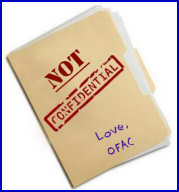Oct
28
Court Rules That OFAC Must Reveal Names of Individual License Holders
 Posted by Clif Burns at 9:47 pm on October 28, 2010
Posted by Clif Burns at 9:47 pm on October 28, 2010
 Category: OFAC
Category: OFAC
 Earlier this month, a federal district court judge in New York ruled that the Office of Foreign Assets Control (“OFAC”) was required to disclose to the New York Times the names of all individuals who had been granted licenses relating to activities in foreign countries, such as Iran, where such activities would otherwise be illegal. OFAC had previously agreed to disclose the names of corporate licensees to the New York Times after it filed its lawsuit seeking names of all companies and individuals with OFAC licenses. (The New York Times lawsuit likely explains OFAC’s decision earlier this year to advise corporate licensees that it would release their identities to the public notwithstanding Exemption 4 of the FOIA which exempts confidential business information from release under the act.)
Earlier this month, a federal district court judge in New York ruled that the Office of Foreign Assets Control (“OFAC”) was required to disclose to the New York Times the names of all individuals who had been granted licenses relating to activities in foreign countries, such as Iran, where such activities would otherwise be illegal. OFAC had previously agreed to disclose the names of corporate licensees to the New York Times after it filed its lawsuit seeking names of all companies and individuals with OFAC licenses. (The New York Times lawsuit likely explains OFAC’s decision earlier this year to advise corporate licensees that it would release their identities to the public notwithstanding Exemption 4 of the FOIA which exempts confidential business information from release under the act.)
In the case of individual licensees, Exemption 6 allows the government to withhold from disclosure under the FOIA “personnel and medical files and similar files.” The court held that Exemption 6 did not apply in this case because, although the names constituted “similar files” under Exemption 6, the individuals’ interest in privacy was outweighed by the public’s interest in disclosure of the names.
OFAC requested and was granted a 45-day stay of the decision. As a result, it seems likely that OFAC will appeal the district court’s decision
 Permalink
Permalink
Copyright © 2010 Clif Burns. All Rights Reserved.
(No republication, syndication or use permitted without my consent.)
One Comment:

The District Court’s decision, if upheld by the Second Circuit, blows a whole in the Wisconsin Project and Timnes Mirror decisions by the DC and 11th decisions, respectively. It at the very least, confines those cases to the facts of the case, i.e., to FOIA cases that were grandfathered in by the last, now ancient renewal of the long expired Export Administration Act of 1979. If IEEPA is the statutory authority for both the OFAC sanctions and the EAR, how can the same statutory text – or rather lack thereof – provide an exclusion for BIS licenses but not OFAC licenses.
The truth of the matter is thatr all the export control agencies have long played favorites, with small businesses and individuals generally getting the shaft unless they are politically well connected. Unlike other federal regulatory agencies that clearly are subject to FOIA and the rest of the Administrative Procedures Act, the lack of accountability for the export control agencies has led to cronyism and arbitrariness, especially at OFAC and DDTC, where there is not one whiff of accountability.
A little transparency by and judicial review of our export control agencies will go a long, long way toward repairing our competitive standing in the world economy. It will also probably mean the end of some official careers whose end cannot come soon enough.
 Earlier this month, a federal district court judge in New York ruled that the Office of Foreign Assets Control (“OFAC”) was required to disclose to the New York Times the names of all individuals who had been granted licenses relating to activities in foreign countries, such as Iran, where such activities would otherwise be illegal. OFAC had previously agreed to disclose the names of corporate licensees to the New York Times after it filed its lawsuit seeking names of all companies and individuals with OFAC licenses. (The New York Times lawsuit likely explains OFAC’s decision earlier this year to advise corporate licensees that it would release their identities to the public notwithstanding Exemption 4 of the FOIA which exempts confidential business information from release under the act.)
Earlier this month, a federal district court judge in New York ruled that the Office of Foreign Assets Control (“OFAC”) was required to disclose to the New York Times the names of all individuals who had been granted licenses relating to activities in foreign countries, such as Iran, where such activities would otherwise be illegal. OFAC had previously agreed to disclose the names of corporate licensees to the New York Times after it filed its lawsuit seeking names of all companies and individuals with OFAC licenses. (The New York Times lawsuit likely explains OFAC’s decision earlier this year to advise corporate licensees that it would release their identities to the public notwithstanding Exemption 4 of the FOIA which exempts confidential business information from release under the act.) Permalink
Permalink

 Posted by
Posted by  Category:
Category: 

